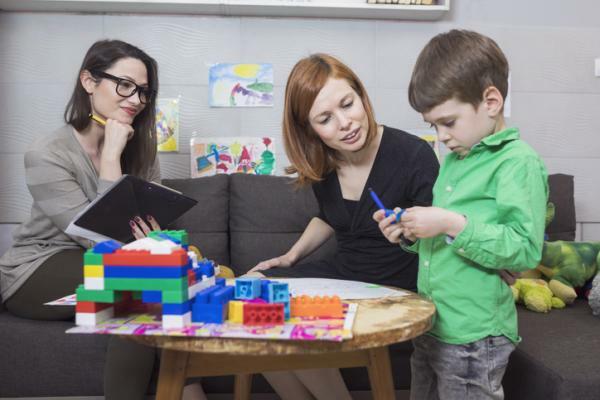
The high sensitivity It is a trait that affects 15% of the population and involves a high degree of sensitivity and reactivity in the person's central nervous system. It is a personality trait, not a disease. The difference that they present with respect to the majority of the population is the way of perceiving and processing the information that, due to certain personal characteristics, makes them act in a different way than the the rest.
Although on many occasions people with high sensitivity (PAS) are perceived as "rare" or different, presenting this trait does not mean anything bad for the person. It is about accepting and integrating this personal characteristic and making the necessary adjustments in your environment so that your daily life becomes something more calm and pleasant.
In the following article we will delve into the subject of high sensitivity in children (NAS): its characteristics, the relationship with high abilities, how to know when a child is highly sensitive, how to treat and educate him and if any type of treatment is necessary psychological.
Index
- Characteristics of highly sensitive children
- Highly sensitive and highly capable children
- How to know if my child is highly sensitive
- How to treat children with high sensitivity
- How to raise highly sensitive children
- Psychological treatment for highly sensitive children
Characteristics of highly sensitive children.
According to Elaine Aron, an American doctor and psychologist who coined the term PAS (highly sensitive people) in the mid-1990s, highly sensitive children or NAS are characterized by four main features:
- Processing depth: they carry out in-depth analysis of situations before taking concrete action.
- Great emotionality and empathy: they feel different emotions in a very intense way due to their great capacity to empathize with certain situations.
- They have great sensitivity before the subtleties that other people hardly notice.
- Over stimulation or saturation: by processing the information in a deep way, environments loaded with stimuli can saturate them since they register all the stimuli without applying any type of filter.
These four characteristics are trait defining aspects without which a child cannot be considered highly sensitive. However, there are a number of characteristics that can accompany NAS, although they do not occur in all cases or equally. These would be:
- They do not tolerate exposure to bright lights, strong odors, and noise well.
- They are persons lonely and introspective that, in some cases, have not specially developed their social skills so they can also be introverted or shy.
- They are especially drawn to the arts, nature and justice. They suffer with the pain of others and, therefore, present attitudes of altruism and solidarity in the face of social or environmental injustices
- They have difficulties connecting with their own limits, which is why they tend to be perfectionists in their interests (without detecting their rest needs, for example), they find it difficult to say "no", etc.
- Precisely because of their difficulty in connecting with their own needs and limits, they tend to be not very spontaneous, which leads them to stress about changes and, above all, in stressful situations.
Highly sensitive and highly capable children.
Here it is worth noting an important aspect to take into account: 90% of gifted children are highly sensitive childrenHowever, not all NAS have high capacities. It is a fact that should be noted since high capacities are usually associated with children who present high sensitivity but, as we have mentioned, not all cases usually reflect this characteristic.
Children with high sensitivity present the four main features described in the previous section and, more randomly, other aspects such as high abilities and other traits but these are not defining by themselves themselves.
Although both traits have many characteristics in common, they are not exactly the same. Studies are currently underway to try to explain the underlying relationship between them.
Here you will find more information about the intellectual giftedness.
How to know if my child is highly sensitive.
Currently, there are several versions of the test initially developed by Dr. Elaine Aron. Among them, Spain has developed one adapted to the Spanish-speaking population that can be found online and whose questions are:
- Do you feel in harmony with nature?
- He likes animals?
- Does lack of sleep affect you especially?
- Do you complain if there is a constant noise?
- Are you easily scared?
- Would you rather collaborate than compete?
- Do you sometimes need to be alone?
- Are you sensitive to pain?
- Do you ask unusual questions for your age?
- Are you wise in dealing with other people?
- Do you follow the rules?
- Do you show an interest in the arts?
- Do you have highly developed senses?
- Is it easy for you to understand complex concepts?
- Does your creative and imaginative capacity stand out?
- Do you tend to be a perfectionist and orderly?
- Do you understand the emotions of others?
- Does criticism affect you a lot?
- Do you usually think a lot before making a decision?
- Do you enjoy being alone?
- Does he complain about the clothes?
- Do you live the emotions with intensity?
This test is a free online test that, in no case, is a definitive diagnosis. In this case, we recommend going to a specialist who will proceed to a more in-depth evaluation.
How to treat children with high sensitivity.
As adults it is necessary and positive for a child with high sensitivity that we recognize her trait and we respect their personal characteristics. In this way, the infant will feel valued and her self-esteem will be reassured.
It is important to acknowledge and be respectful in the matters that concern you because, although they are insignificant things to us, they are truly relevant to them. Some of the aspects that usually concern NAS are usually:
- injustices of all kinds
- problems / tension between people
- suffering of others
- crowded or overstimulated environments
- surprises and unexpected changes
- lack of affirmation and recognition of the loved one.
Calmly and respectfully accompany the children In these situations, it will help them feel safe, which will help them better cope with those moments.
How to educate highly sensitive children.
The education of boys and girls in general is not easy. He presents very pleasant moments and others a bit more complicated to cope with. In the case of children with high sensitivity, the same occurs but the intensity of the sensations increases, both of well-being and of discomfort, precisely because of the most intense emotional response of the infant.
NAS education requires a lot of presence, true attention, understanding and empathy. It is important to bear in mind that fatigue, stress and over-stimulation, both in the child and in the children parents or educators, will hinder a respectful accompaniment and will increase the possibilities of situations conflicting. In many cases, one of the parents also has the high sensitivity trait, so the Accompanying your child becomes a major feat due to its own characteristics and sensitivity.
In reality, it is about performing a respectful accompaniment, like that of any other child, who attend to their particular needs and respect their peculiarities. Calm, patience, and self-care will help you to better cope with difficult situations.
Psychological treatment for highly sensitive children.
High sensitivity is not a psychiatric disorder but a personality trait. That is why children with high sensitivity do not require any specific psychological treatment, unless present specific problems in some area of their life, a consequence, normally, of not coping and integrating this trait as something of your own. In these cases, it is advisable to request the help of a professional who offers tools to the child and to her family to accept the trait and focus on the great potential that developing it can bring adequately.
It is equally important to rule out any disease or disorder that may be masking the high sensitivity trait or, conversely, correctly diagnose something that was initially perceived as NAS.
In case of doubt, request specialized professional help It is the best option to clarify the situation.
This article is merely informative, in Psychology-Online we do not have the power to make a diagnosis or recommend a treatment. We invite you to go to a psychologist to treat your particular case.
If you want to read more articles similar to Highly sensitive children: characteristics and how to educate them, we recommend that you enter our category of Emotional and behavioral disorders.
Bibliography
- Association of People with High Sensitivity of Spain. "High Sensitivity and PAS" recovered from: https://www.asociacionpas.org/alta-sensibilidad/
- Spanish Association of High Sensitivity Professionals. "What is high sensitivity?" Y "High Sensitivity Test" recovered from: https://pasespana.com/
- Zebers Beijl, K. "What is high sensitivity?" recovered from: https://www.personasaltamentesensibles.com/alta-sensibilidad/


